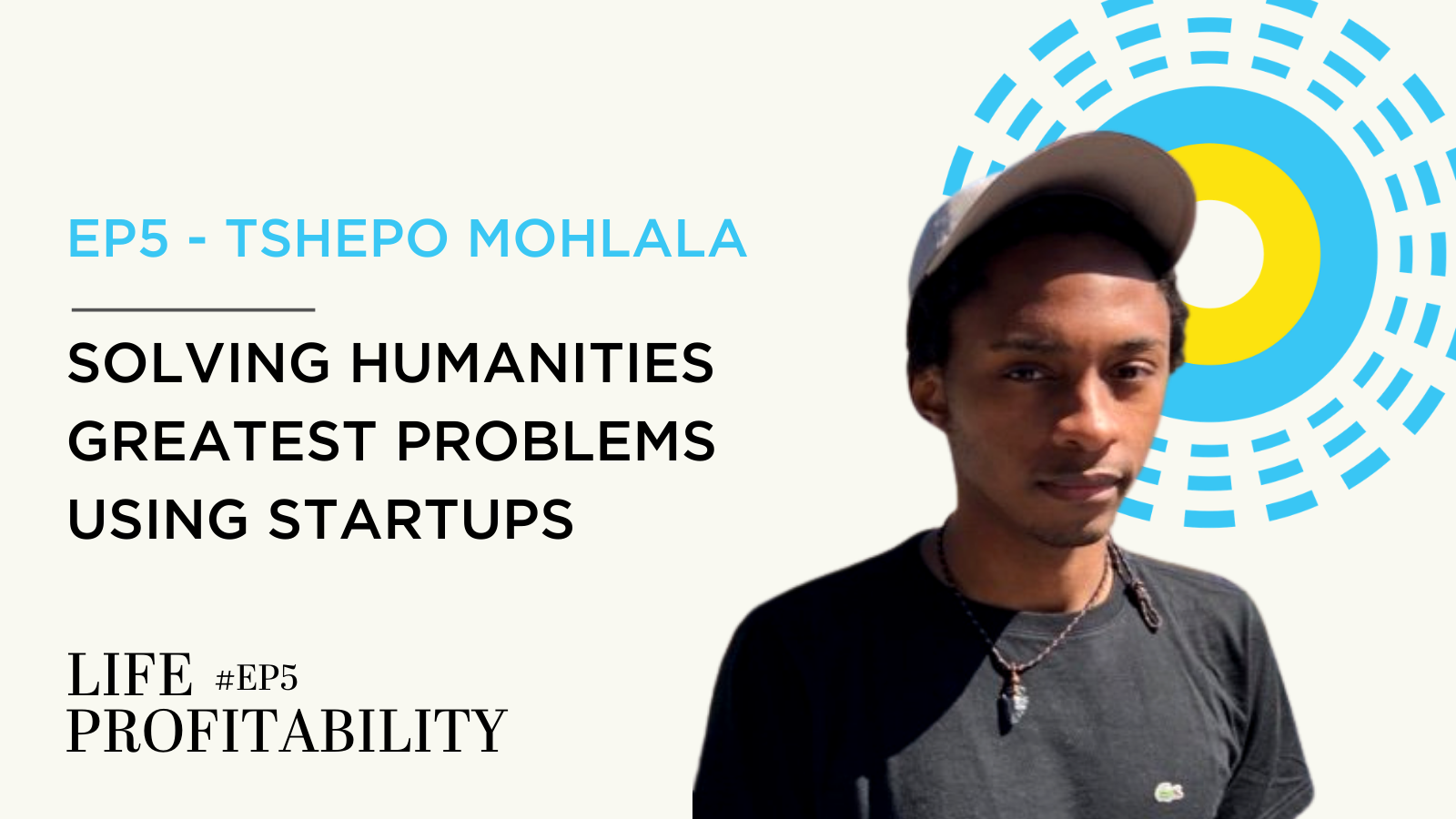Summary
Tshepo Mohlala is the founder of Metacode, a search tool for coders and engineers, and Aspect, a website building platform. He aspires to create real change in the world—his ultimate goal: solve human aging. In this episode Adii and Tshepo discuss how growing up in South Africa and where you get an education can greatly affect your worldview; expanding Silicon Valley ambitions beyond San Francisco; and the concept of going big and going home.
Adii and Tshepo were first linked up by their mutual friend, digital designer Tim Van Damme. Be sure to check out Life Profitability Ep. 3 to hear from Tim!
What Shapes a Worldview
A majority of his life, Tshepo has split his time between life in South Africa and the United States, often traveling back and forth between San Francisco and Cape Town, and more recently, Johannesburg.
Growing up in South Africa, Tshepo often felt guided down a specific path that was not necessarily what he truly wanted to pursue. Having been known as “the math guy” in high school, it only made sense—at least to his teachers—that he would go on to pursue a career as an actuary. This is ironic since he would go into a field fraught with risk and uncertainty!
There appeared to be, Tshepo explains, a social tax on ambition in South Africa. His explanation for this is that it is a relatively new democracy. Therefore the country doesn’t yet possess a “strong economic identity”, nor have as much exposure to entrepreneurship as the world at large.
Where We Learn, What We Learn
His father’s career is what brought him to the US originally, and eventually he was accepted to the University of Chicago to study Mathematics. Despite going to college to become an actuary, his personal essays more than hinted at his interest in startups and a desire to make change in the world. During his time there he discovered that many students did not have as clear of a path in mind as he seemed to. That’s when he realized that it was alright to explore different fields and interests.
Tshepo would have to break out of the box that he’d been placed in in South Africa, and expose himself to his own greater ambitions that had been there all along.
Eventually, Tshepo realized he wanted to start a company. He didn’t know what it was yet, but he definitely knew he wanted to make some kind of change or innovation. Elon Musk served as a catalytic role model—things seemed way more possible when he saw what Elon Musk had done.
Tshepo from South Africa
Often, “Tshepo from South Africa” is how he is referred to in the tech world. His initial introduction as such, happened when he worked with Pioneer, a company that funds projects and startups, promoting and creating a narrative for worldwide startup ecosystem exposure beyond Silicon Valley—which many falsely believe is the only place startups can truly thrive.
Despite his commonly used tag as a South African, Tshepo has never felt a need to be a flag bearer for the country. In fact, he has found a lot of people from South Africa are in the startup ecosystem in San Francisco, which only enforces his initial feeling that he didn’t need to advocate for his nationality.
Simply put, he has never felt that nationality makes or breaks your brand, though in the US he has found there is an unavoidable collision with brand and identity.
Tshepo says it can be hard to know if he is in a position to take part in some kind of activism in relation to his identity. Elon Musk’s identity as a South African is one thing, but it’s his success that inspired Tshepo more than anything else.
Go Big and Go Home
“When you’re founding a company there’s kind of no room for almost anything else… startups incur a cost on the person who’s starting them.”
The idea is that if you really want to “go big” you should have the rest of your life in order, have something to go back to. Tshepo doesn’t really agree with this sentiment.
He doesn’t think it’s possible to aim to found a billion dollar company while also saying you want a whole, complete life. The way you split your time can affect your success rates—if you are putting time into something else, it’s just that much extra time taken away from your startup and your goal.
“Most startups fail. If you want to be successful I think you have to put everything you have into it.”
The younger you are, the better off, Tshepo says—mostly because you have less obligations than someone who may have a family that they wish to split their time with between the startup.
Solving Human Aging
The reason he’s doing any of this, he says, is because he wants to solve an age-old problem. A problem that has prevented the solving of so many other crucial problems: a lack of time. More specifically, Tshepo wants to solve the issue of human aging.
Studying math in college he recognized that there are so many open problems that take hundreds of years and generations to solve. Many mathematicians and scientists want to solve a problem that may not be solvable in one lifetime. The solution to this lack of time is increasing the time you have alive. AI and gene editing are proof that even the craziest of ideas can become a reality in this day and age.
Elon Musk gave Tshepo the metaphorical blueprint, he says. While grants for such “out there” aspirations can be hard to possess, a high capital startup is the solution. Metacode works as this capital to fund further investigation into Tshepo’s ultimate goal of solving the (age old) age dilemma.
FIND TSHEPO

